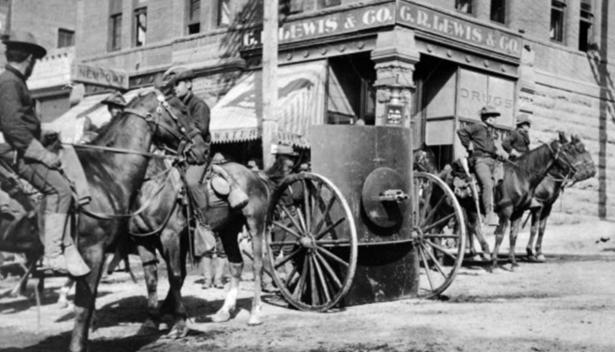Due to technical difficulties, this edition of This Week in People’s History is abbreviated.
A Very Unusual Strike
130 YEARS AGO, on June 11, 1894, a bitter strike by thousands of Western Federation Miners members in Colorado was settled in their favor. The outcome was the result of both the strikers' determination and the virtually unprecedented armed intervention by the state government in support of the strikers.
The strike began in response to the mine owners' decision to take advantage of widespread unemployment among miners and impose a 17-percent pay cut even though the mines were operating profitably at the prevailing wage. Very soon after the strike began, the smaller mines in the Cripple Creek mining district agreed to rescind the pay cut and reopened, but the large mines remained closed.
After a month, the large mines attempted to reopen with scab labor protected by thugs. As fighting between strikers and thugs escalated and grew increasingly deadly, Colorado's governor dispatched the state militia to Cripple Creek with the mission of protecting the miners from the thugs. With the militia keeping the thugs in check, the large mines had almost no success in reopening. On June 11 the large mines agreed to rescind their attempted wage cut and resume production. https://progressive.org/latest/Cripple-Creek-1894-Mining-strike-180209/
A Bad Day for the African National Congress
60 YEARS AGO, on June 12, 1964, after a 9-month trial on charges of conspiracy to commit sabotage and promote communism, a South African Court sentenced Nelson Mandela and seven other leading members of the African National Congress to life in prison; it was the beginning of Mandela’s imprisonment for more than 25 years. Four years after he was released, he was the first person elected President of South Africa in a democratic election. https://www.anc1912.org.za/rivonia-trial-the-rivonia-trial/
Nazi Germany’s Secret Weapons
80 YEARS AGO, on June 13, 1944, exactly a week after D-Day’s invasion of German-occupied France, the Nazis gave every appearance of throwing a deadly tantrum.
For the first time, they targeted Britain with a hitherto secret weapon, the first cruise missile. The jet-powered V-1 was essentially an uncrewed 1-ton bomb with wings. And the tantrum wasn’t over, because a week later the Nazis launched an experimental V-2 – the world’s first guided ballistic missile – in a demonstration flight. The day’s launch, which did not carry a warhead, was aimed nearly straight up and became the first artificial object to reach outer space. The timing of the two events was regarded by some as an ominous signal that the Nazis’ attempt to build the first atomic weapon might not be far from completion.
Before the Germans surrendered 11 months later, they had launched some 9500 V-1s at the UK, which killed about six thousand people and wounded 16,000. Once the V-2s were ready to be used as a weapon, in September 1944, the Germans fired more than three thousand of them at allied targets in the UK and mainland Europe, killing an estimated 9,000 civilians and military personnel.
https://www.iwm.org.uk/history/the-terrifying-german-revenge-weapons-of…
Sticking it to Robert E. Lee
160 YEARS AGO, on June 15, 1864, the Civil War had been going for three years and the Union was struggling.
Confederate troops had just defeated Union forces just 90 miles south of Washington, D.C. Five thousand Confederate troops were 135 miles from D.C., marching north and aiming to invade the capital. It was an important moment for the Union to stage a low-risk, in-your-face move that would both build morale and demoralize the Confederacy.
What better way to stick it to the rebels than to turn Robert E. Lee’s 1100-acre estate, just across the Potomac from D.C., in Arlington, Virginia, into a cemetery for Union soldiers, including African-Americans? On this day, Arlington National Cemetery was established, providing the Union with an expanse of picturesque land where enslaved people had once toiled for Robert E. Lee and his family. https://www.smithsonianmag.com/history/how-arlington-national-cemetery-…


Spread the word